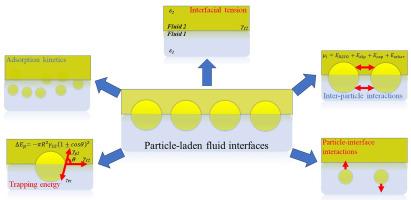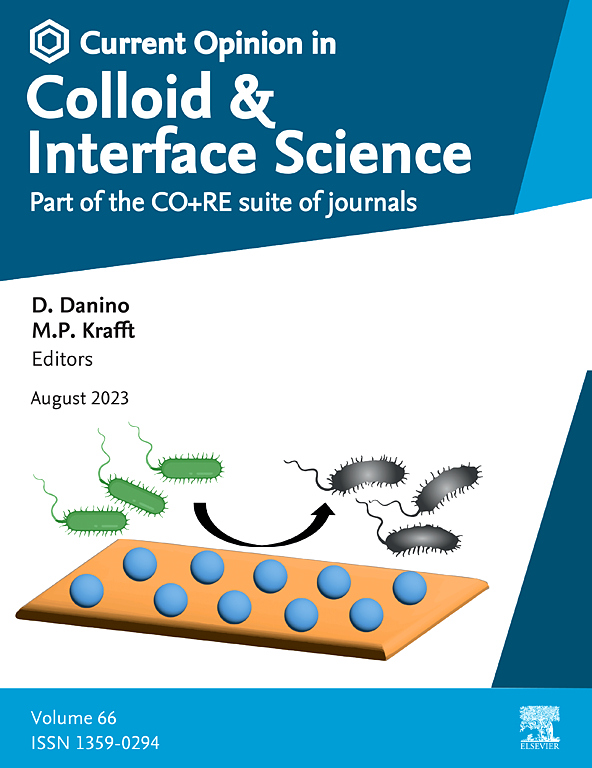A critical examination of the physics behind the formation of particle-laden fluid interfaces
IF 7
2区 化学
Q1 CHEMISTRY, PHYSICAL
Current Opinion in Colloid & Interface Science
Pub Date : 2024-09-21
DOI:10.1016/j.cocis.2024.101868
引用次数: 0
Abstract
Particle trapping is a powerful tool for tailoring fluid interfaces, offering unprecedented control over interfacial properties and behaviors. In this review, we delve into the intricate mechanisms driving the trapping of particles at the fluid interface. By strategically manipulating particles at fluid interfaces, researchers have unlocked a myriad of opportunities for engineering interfacial phenomena with precision and versatility. In fact, particle trapping strategies enable tailored modifications of fluid interfaces that span a wide range of length scales and material systems. This work explores the underlying principles governing particle–surface interactions, highlighting key factors such as particle size, shape, surface chemistry, and interfacial tension. Through a comprehensive examination of recent developments, this review provides valuable insights into the transformative potential of particle trapping for shaping fluid interfaces, paving the way for innovative applications across various disciplines, including materials science, biotechnology, and environmental engineering.

对形成含有颗粒的流体界面背后的物理学原理进行批判性研究
颗粒捕集是定制流体界面的有力工具,可对界面特性和行为进行前所未有的控制。在这篇综述中,我们将深入探讨驱动流体界面颗粒捕集的复杂机制。通过战略性地操纵流体界面上的颗粒,研究人员为精确而多变地设计界面现象提供了无数机会。事实上,粒子捕集策略可以对流体界面进行量身定制的改造,其范围涵盖了各种长度尺度和材料系统。本研究探讨了颗粒与表面相互作用的基本原理,突出了颗粒大小、形状、表面化学和界面张力等关键因素。通过对最新进展的全面考察,这篇综述对颗粒捕集在塑造流体界面方面的变革潜力提供了宝贵的见解,为材料科学、生物技术和环境工程等各学科的创新应用铺平了道路。
本文章由计算机程序翻译,如有差异,请以英文原文为准。
求助全文
约1分钟内获得全文
求助全文
来源期刊
CiteScore
16.50
自引率
1.10%
发文量
74
审稿时长
11.3 weeks
期刊介绍:
Current Opinion in Colloid and Interface Science (COCIS) is an international journal that focuses on the molecular and nanoscopic aspects of colloidal systems and interfaces in various scientific and technological fields. These include materials science, biologically-relevant systems, energy and environmental technologies, and industrial applications.
Unlike primary journals, COCIS primarily serves as a guide for researchers, helping them navigate through the vast landscape of recently published literature. It critically analyzes the state of the art, identifies bottlenecks and unsolved issues, and proposes future developments.
Moreover, COCIS emphasizes certain areas and papers that are considered particularly interesting and significant by the Editors and Section Editors. Its goal is to provide valuable insights and updates to the research community in these specialized areas.

 求助内容:
求助内容: 应助结果提醒方式:
应助结果提醒方式:


